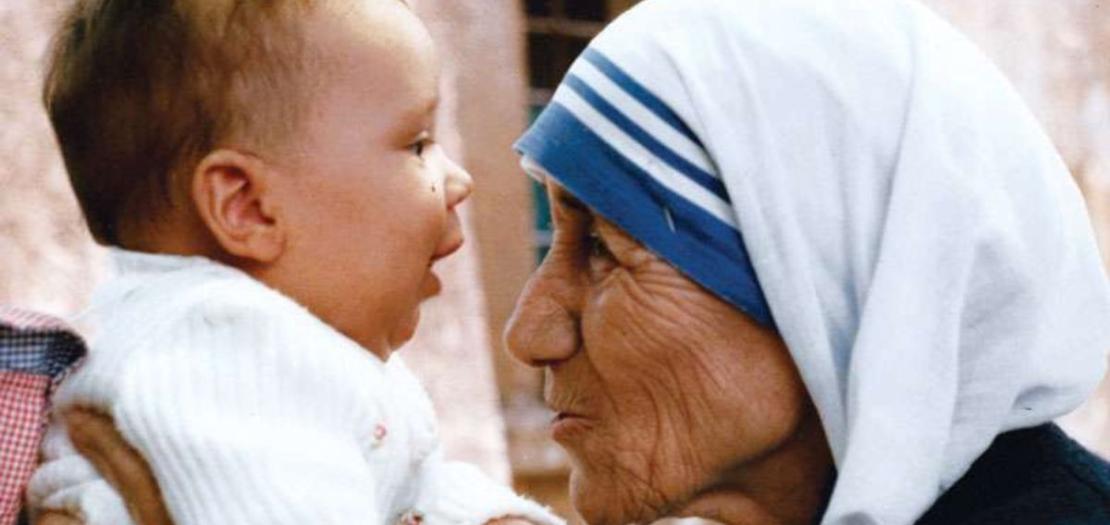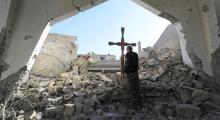Issued by the Catholic Center for Studies and Media - Jordan. Editor-in-chief Fr. Rif'at Bader - موقع أبونا abouna.org

A new movie weaves together the lives of two women experiencing self-doubt, but, in the end, both women meet the challenge of their vocations despite their personal struggles.
“Mother Teresa and Me” tells the story of Kavita, a young woman who finds herself with an unexpected pregnancy. Battling whether or not to get an abortion, she returns to her hometown in India where her now very old nanny shares the story of Mother Teresa’s first days working in the streets of Calcutta.
Learning how Mother Teresa faced many doubts after no longer being able to hear the voice of Jesus, Kavita is inspired.
Following publication of this story, Father Brian Kolodiejchuk, the director the Mother Teresa Center, issued a statement in which he claimed the film’s writer and director, Kamal Musale, had committed several “crucial errors” in his approach to the film, including Musale’s allegation that the nun “lost her faith” at some point in her life.
“As her own writings attest,” Kolodiejchuk wrote, “one of the most profound things about Mother Teresa is that she never ‘lost her faith,’ even amid desolation and uncertainty. Her personal letters speak of her ‘unbroken union [with God]’ during her darkness and observe that ‘my mind and heart is habitually with God.’”
For one night only on October 5, the movie will be released by Fathom Events in 800 theaters across the United States.
Jacqueline Fritschi-Cornaz is the actress who plays Mother Teresa in the movie. She spoke with CNA about how she prepared for the role, what she learned from the saint she portrayed, and how her time in India inspired her to start a foundation.
Fritschi-Cornaz explained that the movie originated 14 years ago when she visited a Bollywood studio in Mumbai, India. While stuck in traffic on her way to the studio, street children began approaching the taxi and knocking on the windows.
“For the first time in my life I met street children and I realized this lack of perspectives,” Fritschi-Cornaz said. “I was tremendously moved and shocked.”
The actress said she knew she had two choices: Either ignore the pain she was experiencing or do something about it.
“For me, it was clear that I had to do something, but I didn’t know what.”
As she entered the Bollywood studio, a painting of St. Teresa of Calcutta hung on the wall. In an instant, Fritschi-Cornaz turned to ask the producer if they had ever thought of making a movie about Mother Teresa.
She explained that her idea was not to make a film about the saint, “but as this human being behind the saint who actually had the courage and the strength to get up every morning to face that misery.”
Unable to find an investor in Bollywood, Fritschi-Cornaz and her husband, Richard, decided to create the Zariya Foundation (Zariya means “source” in Urdu). The Zariya Foundation aims to alleviate the suffering of the poor, abandoned, sick, and dying and uplift the standards of health and education for the youth around the world, according to its website.
The goal for the married couple was that the foundation and film would be “the source of inspiration for audiences worldwide. And, on the other hand, a source of financial support for the poorest children in education and health care.”
Shortly after that, they discovered Musale, a Swiss-Indian filmmaker who wrote the script, and production began.
The film was entirely financed by donations, allowing all proceeds to be distributed to the poor instead of having to repay outstanding costs with the money generated by ticket sales.
Fritschi-Cornaz shared that in order to prepare for the role she worked with the Missionaries of Charity, the congregation Mother Teresa founded in Calcutta, at the Shishu Bhavan, which is a home for children who are abandoned, physically and mentally challenged, malnourished, or suffering from other diseases.
Additionally, the Swiss actress spent time with several of Mother Teresa’s relatives in Skopje, North Macedonia, which was once Albania.
She explained that the family members were all jewelers and gave Fritschi-Cornaz a cross.
“I wore this cross on the saree during the shootings and so I always had the family with me, which was very supportive,” she said.
Fritschi-Cornaz added that she spent time reading Mother Teresa’s letters where she wrote about her sufferings and doubts she experienced during parts of her life.
“I was so touched and I thought, ‘This is really important for me to bring that into expression and to show people around the world what this woman did, how she suffered, but still she didn’t give up and she continued with her vocation, with her vision,’” she expressed.
She added, “And that really showed me that we actually, all of us, are able to do much more than we always believe.”
Fritschi-Cornaz said she hopes the film will “inspire a lot of people around the world, to keep their own dreams, to keep with their visions, and to stay with them, even in times of troubles and doubts” and that people will leave “inspired and full of hope and strength and new ideas.”







